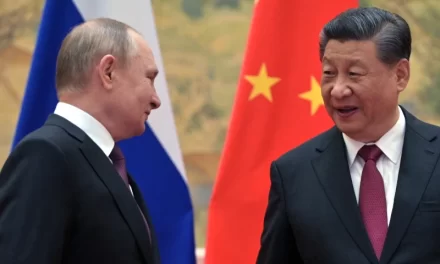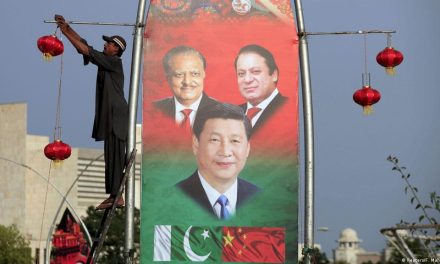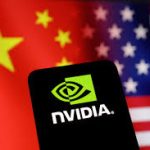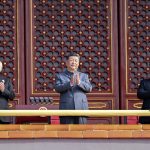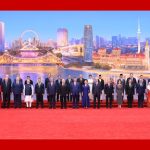By Jianli Yang & Xueli Wang
The fact that President Joe Biden chose South Korea as the first stop of his first Asian tour since his inauguration is significant. Washington and Seoul are seeking to upgrade their military alliance into a “comprehensive global strategic alliance.” But they also want to upgrade their economic

US President Joe Biden visits Seoul National Cemetery
May 21, 2022
Seoul National Cemetery, Dongjak-gu, Seoul
KOCIS(Korean Culture and Informatioon Service)
Official Photographer : JEON HAN
All photographs in the official Flikr account of the Republic of Korea are available only for publication by news organizations and/or for public purposes with proper attribution to the correct source (photographer and organizations mentioned above).
Any distortion to the original meaning of a photograph for provision to a third party through posting and resale, partial reproduction, falsification or use of the photograph with other images is strictly prohibited without the express written permission of the government of the Republic of Korea.
Thank you.
—————————————————-
조 바이든 미국 대통령 국립서울현충원 참배
2022-05-21
국립서울현충원
코시스(해외문화홍보원)
전한
플리커 채널 ‘Republic of Korea’에 게재되는 대한민국정부 사진은 올바른 저작권 이름 (촬영자 / 상기 명기된 기관)으로 표기한 이후 보도 혹은 공익목적으로 사용하실 수 있습니다.
의미를 왜곡하는 맥락에서 사진을 게시하고 재판매, 부분 복제, 변조 또는 다른 이미지에 통합하는 것과 같은 사진의 모든 수정, 자료를 제3자에게 제공하는 것은 대한민국정부(운영자/저작권자)의 명시적인 허가 없이 금지됩니다.
ties into a “technological alliance,” with the intent of developing technology and supply chain collaboration based on shared values. South Korean President Yoon Seok-yeol described the US–South Korean partnership as an “economic and security” alliance, emphasizing that “economy is security, and security is economy.”
This statement may shed light on the untold dilemma of East Asian countries in recent years.
These countries’ security depends on the United States, and their economies on China. Over the past two decades, most East Asian countries have struggled to maneuver between these two superpowers. This has been true for the Association of Southeast Asian Nations (ASEAN) countries as well as for Japan and South Korea, which have always had close military alliances with the United States. Singapore is also a leading advocate of a balanced diplomatic relationship between China and the United States. In his book Hard Truths to Keep Singapore Going, Lee Kuan Yew, the late Singaporean prime minister, describes how diminutive Singapore had to struggle to thrive among its powerful neighbors while maneuvering between two global hegemons—China and the US. It was Lee who formulated Singapore’s policy to “not choose sides between America and China.”
Indeed, there is a pragmatic historical wisdom to the hedging-and-balancing strategy of “economic reliance on China and security reliance on the United States.” However, effectively achieving such a fine balance entails two prerequisites. First, the Chinese Communist Party (CCP) must have enlightened, rational leaders who can credibly guarantee that China will “rise peacefully and refrain from any hegemonic aspirations” well into the future. Second, in its dealings with the US and other foreign powers, Beijing must learn to embrace healthy competition based on a market economy and common interests, whereby a CCP-ruled China gradually integrates into a rule-based world order.
A report published by Singapore’s ISEAS–Yusof Ishak Institute in 2021 shows that although China provided the most financial aid to Southeast Asia during the COVID-19 pandemic, distrust of China has increased in the region. For example, 63 percent of respondents do not trust China to “‘do the right thing’ to contribute to global peace, security, prosperity and governance,” while only 17 percent of respondents are confident that China will “do the right thing.” A majority of respondents deemed that “China’s economic and military power could be used to threaten my country’s interest and sovereignty.” Nearly 90 percent of respondents who regard China as Southeast Asia’s “most influential political and strategic power” worry about China’s political and strategic influence.
Lee, too, was acutely aware of the CCP’s bullying ways. Unlike the United States, which Lee noted does not “force [democracy] down your throat,” the Chinese regime is “not interested whether you run a democracy or you’re despotic. They just want you to comply with their request.” And China can often ensure this outcome just by squeezing other countries economically, leaving them gasping for air.
Even if most East Asian countries are reluctant to choose sides, how long can they sustain the precarious state of “economic reliance on China and security reliance on the United States”? As China transitions from “peaceful rise” to “wolf warrior diplomacy,” and as the competition between Beijing and Washington takes on more and more cold war characteristics, East Asian countries are increasingly stuck between a rock and a hard place.
On the international stage, observers once regarded China as a humble underdog. Today, they perceive the totalitarian state as the neighborhood bully that flaunts its wealth and power. As the CCP becomes a growing economic and security threat to East Asia, the United States is using a new cold war strategy of forging a values-based diplomatic alliance that welcomes East Asian democracies and shuns authoritarian regimes like China and Russia.
If South Korean President Yoon simply chooses to side with the United States, what are his chances of success? He simultaneously faces three favorable conditions and three potential crises.
Favorable Conditions
(1) In the eyes of today’s South Koreans, China is no longer the Korean people’s long-lost ancestral home. Since the Chinese Communist Party came to power, etiquette and decorum have fallen by the wayside in China. Apart from its sheer economic size, China has nothing for South Koreans to look up to or respect. On the contrary, the CCP’s continued pumping of blood money into the North Korean regime is an enduring violation of the South Korean people’s feelings. And the Chinese government’s firm opposition to the deployment of a THAAD anti-missile defense system in South Korea in 2017 has raised anti-China sentiment among South Koreans to unprecedented highs.
(2) The United States clearly intends to elevate the status of South Korea in its Indo-Pacific strategy and mold democratic South Korea, with its special geopolitical position, into a globally influential country. In 2021, South Korea’s economy ranked tenth worldwide as measured by nominal GDP, making it one of the most economically prosperous countries. South Korea also ranks among the global leaders in the electronics industry and will play an important role in President Biden’s recently launched Indo-Pacific Economic Framework for Prosperity (IPEF), through which South Korea and other countries will gradually reduce their economic reliance on China.
(3) South Korea is renowned for its entertainment industry and K-pop culture. In stark contrast to its neighboring dictatorships of North Korea and China, South Korea has more than enough soft power to become a model for democratic governance.
Potential crises
(1) South Korea is not only at the center of the North Korean nuclear threat, but it also faces direct pressure from three nuclear-armed states—Russia, China, and North Korea.
(2) Although South Korea and Japan are both allies of the United States, the two East Asian countries have a long history of bad blood. If Seoul offends Beijing, will South Korea’s only remaining “friendly” neighbor—Japan—help ease its geopolitical pressure, or deepen it? There is no definitive answer to this question.
(3) At present, China is South Korea’s largest trading partner and largest market for imports and exports. The South Korean economy relies far more on China than on either Japan or the United States. Transformation will require time, resources, and a persistent willingness to bear the cost. Will South Korea have the fortitude to survive, even if it requires substantial sacrifices?
If South Korea makes such sacrifices, will the United States ease the pain? In an ever-changing geopolitical environment, there is no guarantee that Seoul’s resolve will remain unshaken. The strength of Washington’s economic and security backing will be critical to ensuring South Korea’s confidence.
What Can the US Do to Reassure South Korea?
First, Washington should provide a security guarantee. After recent disputes over military cost-sharing, the US must firmly maintain its military presence in South Korea and be willing to foot the bill. After all, the US investment in a South Korean military presence is certainly worthwhile compared to the potential risks that could arise from a departure. In addition, the new South Korean administration has expressed a desire to join the Quadrilateral Security Dialogue (QSD, or the Quad), but South Korea’s addition to the QSD is “not currently under consideration” by Washington. Regardless of whether resistance from Japan is part of the reason for this, the decision to include Japan in the QSD but exclude South Korea is regrettable. Since the United States needs South Korea to play an outpost role within the framework of its security alliance, it should give Seoul the status and respect it deserves. South Korea’s desire to join the Australia–UK–US security pact (AUKUS) also merits serious consideration by Washington.
Second, despite historical South Korea–Japan tensions, the United States should actively mediate between the two countries and help forge a trilateral security and economic alliance so that they can achieve a sense of unity based on shared values.
Finally, the United States should take concrete steps to help South Korea implement the articulated policy that “the economy is security and security is the economy.” For example, by gradually improving the security of South Korea’s supply chain through IPEF, Washington can induce other American allies, including Europe, to open up their markets more to South Korea. And with South Korea’s prowess in the technology sector, the US and South Korea can strengthen cooperation in communications- and cyber-security.
Of course, implementing such an agenda will not necessarily be smooth sailing for the United States. But precisely because of the foreseeable difficulties, a US–South Korea economic and security alliance, if successful, would become all the more significant as a model for other East Asian countries.
Dr. Jianli Yang, a former political prisoner of China and a Tiananmen Massacre survivor, is founder and president of Citizen Power Initiatives for China and the author of For Us, The Living: A Journey to Shine the Light on Truth.
Xueli Wang, an independent scholar, is Managing Director of CSI Research and co-author of Made in China, Marken – und Produktpiraterie – Strategien der Fälscher & Abwehrstrategien für Unternehmen.
This article first appeared in Providence on June 16, 2022


